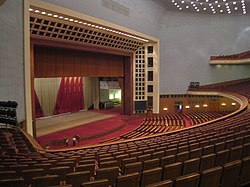National People's Congress
|
National People's Congress 全国人民代表大会 Quánguó Rénmín Dàibiǎo Dàhuì |
|
|---|---|
| 12th National People's Congress | |
 |
|
| Type | |
| Type | |
| Leadership | |
|
1st Vice Chairman
|
|
| Structure | |
| Seats | 2,987 |
 |
|
|
Political groups
|
|
| Elections | |
|
Last election
|
March 5–17, 2013 1st Plenary Session |
| Meeting place | |
 |
|
| Great Hall of the People, Beijing | |
| Website | |
| npc.gov.cn/englishnpc/ | |
| National People's Congress | |||||||
| Simplified Chinese | |||||||
|---|---|---|---|---|---|---|---|
| Traditional Chinese | |||||||
| Literal meaning | Nationwide People Representative Assembly | ||||||
|
|||||||
| Transcriptions | |
|---|---|
| Standard Mandarin | |
| Hanyu Pinyin | Quánguó Rénmín Dàibiǎo Dàhuì |
The National People's Congress (usually abbreviated NPC) is the national legislature of the People's Republic of China. With 2,987 members in 2013, it is the largest parliamentary body in the world. Under China's current Constitution, the NPC is structured as a unicameral legislature, with the power to legislate, the power to oversee the operations of the government, and the power to elect the major officers of state. The NPC and the National Committee of the People's Political Consultative Conference (CPPCC), a consultative body whose members represent various social groups, are the main deliberative bodies of China, and are often referred to as the Lianghui (Two Assemblies).
The NPC is elected for a term of five years. It holds annual sessions every spring, usually lasting from 10 to 14 days, in the Great Hall of the People on the west side of Tiananmen Square in Beijing. The NPC's sessions are usually timed to occur with the meetings of the CPPCC, and these annual meetings provide an opportunity for the officers of state to review past policies and present future plans to the nation.
The fourth session of the 12th NPC was held from March 5 to March 16, 2016.
In theory, the NPC is the highest organ of state power in China, and all four PRC constitutions have vested it with great lawmaking powers. Since the 1990s, the NPC has become a forum for mediating policy differences between different parts of the Party, the government, and groups of society. However, it is still reckoned as a rubber-stamp for decisions already made by the state's executive organs and the Communist Party of China. One of its members, Hu Xiaoyan, told the BBC in 2009 that she has no power to help her constituents. She was quoted as saying, "As a parliamentary representative, I don't have any real power." In 2014, the participating party pledged to "unswervingly adhere to the leadership of Chinese Communist Party."
There are mainly four functions and powers of the NPC:
1. To amend the Constitution and oversee its enforcement
Only the NPC has the power to amend the Constitution. Amendments to the Constitution must be proposed by the NPC Standing Committee or 1/5 or more of the NPC deputies. In order for the Amendments to become effective, they must be passed by 2/3 majority vote of all deputies.
...
Wikipedia
